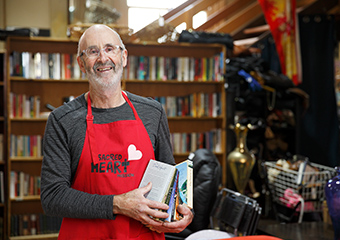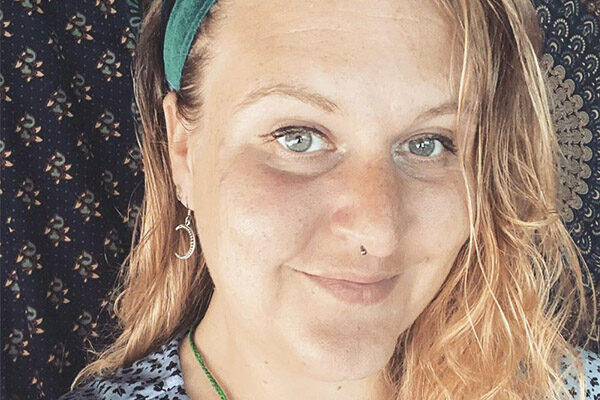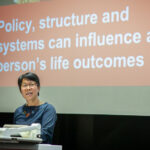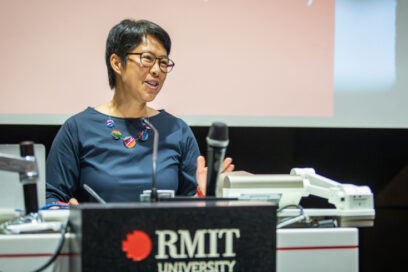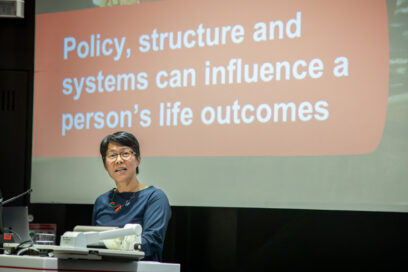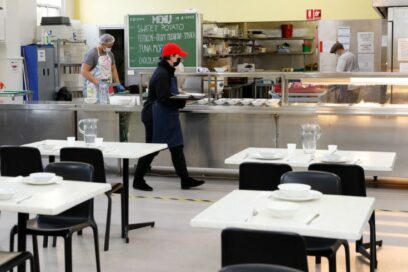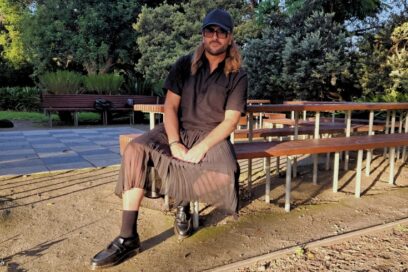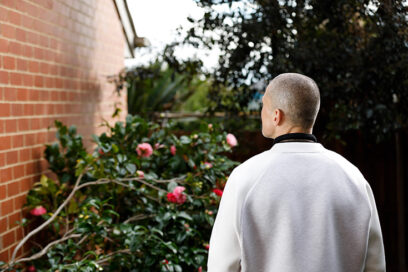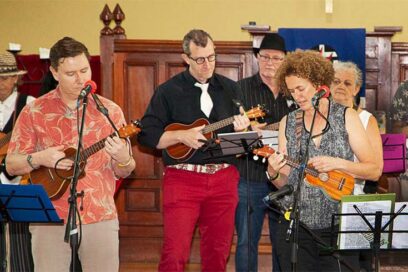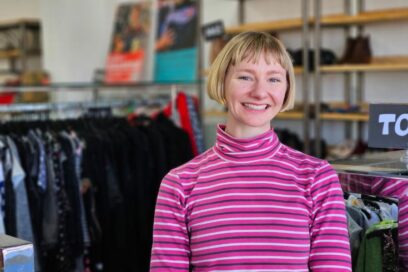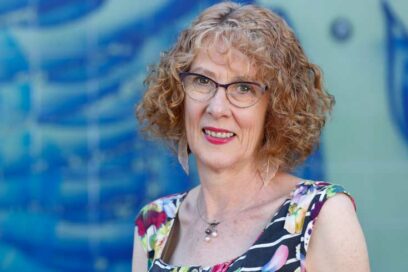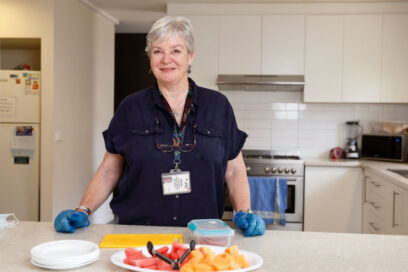We caught up with Liz, a Peer Support Worker in our Journey to Social Inclusion Program, to learn more about her work and how she support clients to build social inclusion in their own community.
Peer Support Workers have a lived experience of homelessness and use that experience to support program participants on their journey towards stable housing and social inclusion.
Interview by Olivia Killeen, Sacred Heart Mission’s Communication and Social Policy Officer
Olivia: Thanks for making the time to talk about Social Inclusion week. Can you tell me a little bit about yourself?
Liz: I’m in my thirties. I’m a single mother. I have experienced multiple stints of homelessness through childhood and adulthood. I’m passionate about inclusion, especially through art-based programs and promoting lifestyles that encourage a person to grow into the version of themselves that they want to be.
These are the things that have helped me become who I am. And I understand from my own personal life, how hard it was to access help, and support.
I don’t want my story to just be about who I was. I’m trying to redefine who I am as this woman now. I’m changing the dialogue around how I speak – to be more recovery based and less about what I’ve overcome.
What made you apply for the Peer Worker role at our Journey to Social Inclusion (J2SI) program?
I engaged in services a few years ago after a loss of a family member. And at that time, I realised how socially excluded I was. And it was peer run activities that made me think, “How amazing would this be if this was more accessible for people?”
So that is part of what made me go and complete some study, so I could work in the community sector. This was one of the first jobs I saw and when I read the position description, it was serendipitous, all the reasons that I wanted to find a job really aligned with my skills. So, I took that leap of faith, having not worked for 10 years.
I’m so glad to work in peer support in J2SI because it is a three-year involvement, and I want to advocate for longer support for people to exit homelessness – that’s one of the best aspects of the program.
I’m so glad that you found your calling. Can you tell me about what peer workers do in J2SI?
I work alongside caseworkers and we discuss things that are happening with their clients. I contribute my experience, my knowledge, different ways to go about things.
When I’m meeting with clients, it’s a lot of, “Yeah, I’ve not only been there, but I’m still living that, I’m still living in [public] housing. I’m still a part of this community”. I become a bridge for them. It’s a space where they feel like they can speak without bias or judgment. I’m that extra support that is needed because a lot of people, when we move from homelessness, or to a new area, we don’t have the social supports that other people have, and it can be a really daunting and lonely space.
In that lonely space, it can create dark thoughts, it can cause extensive substance use. In my role, I offer not just support, but it’s like a friendship. I treat the people I work with, with dignity and respect, and I encourage them to look more for those people in their own community that treat them the same way. I help people connect to like-minded individuals that bring out the best in them.
It can do a lot for someone, it can build self-worth, and within that someone can start to make different choices. When we do that, we become a different person, become who we’re supposed to be, not who our trauma or hardship has made us into.
And slowly you start to realise that you belong, that you’ve always belonged and there’s always been space for you. You just might not have seen it or been able to access it due to your own fears and your own personal judgment of what you think you deserve. My support workers were able to do that for me, and that’s why I wanted to be that person to others.
Can you give some examples of how you support clients to build social inclusion in their own community?
One of the ways to help is to find out what that person is interested in. Is there a desire for a hobby, but there’s been reasons why they couldn’t try it, such as money or maybe feeling overwhelmed? How do they like to enjoy spending their time? Do they know that there are other people out there that like spending time the same way?
For example, if we have someone that likes being in nature, we get them connected with the local parks and recreation spaces. There’s someone that likes to do art, so get them to art-based groups. Those are the building blocks of how we can incorporate social inclusion. Also, by finding housing that suits a person’s lifestyle – not just their therapeutic needs, like access to their doctors and chemists, but what will help them build the life they want.
What are some small or big wins with clients in the time that you’ve been working as a Peer Support Worker?
I feel I have been able to help people settle into their new location by familiarizing themselves with where they live. I’ve been doing a lot of walks with clients. We’ve started talking about like, “Oh look, that’s a cool cafe. Might want to try that out.” Or, “These are services you need, or the community centre. There’s Centrelink, here’s your supermarket.” These all become places that people will be using when they move into their housing.
I encourage someone to find a reason to leave the house once a day – I think that’s a really important part of someone’s mental health. And so, once they’ve been able to familiarize themselves with their surroundings, they start to feel more comfortable and confident in interacting with people.
For the people you work with – how has Covid-19 and the lockdowns impacted on social inclusion?
It is very challenging. Unfortunately, for places like Sacred Heart Mission’s Dining Hall – no one’s been able to sit down and eat together. These meal centres have been one of the biggest epicentres of social inclusion and re-dignifying and re-humanizing someone.
So, I think it’s not just about how do we get people to be socially included, it’s how do we heal what’s happened?
We’re working with people who have experienced high levels of trauma. Wearing face coverings is so difficult for so many people. And what tends to happen when it becomes difficult is you make a choice – do I put myself in this position where I’m going to possibly make my mental health struggle, or do I just stay home?
Yeah. And then it’s this cycle because by staying home, when you’re not interacting, you’re more isolated.
It’s a really heavy topic at the moment. I guess that’s what it all comes down to, we are all in the same storm but in vastly different vessels that are carrying us through.
In society, there’s these really beautiful people, with so much to give and so much potential, and they just don’t feel like they belong. They don’t feel welcome in spaces. The truth is that most of the people that we’re working with, they didn’t even feel welcome in their own home when they were a child – never.
Imagine growing up, thinking that you weren’t welcome in the world, how does that translate into adulthood? And then you’ve rough slept for so long that people stopped looking at you.
Social inclusion starts with de-stigmatisation and not seeing a statistic. We’re talking about people that have gone from never having someone look at them, now they’ve got keys in their hands and you’re expecting them to have the skills to be socially included?
That’s where I step in. That’s where I’m like, “Let’s practice social skills with Liz!” Let’s practice what a conversation looks like, that isn’t based on recovery, and isn’t based on housing and isn’t based on doctors, or medication. Let’s just practice, “Hi. How are you? What would you like to drink?”
Because everyone needs to learn those skills, but the people I work with are not used to even having that opportunity.
Why is social inclusion so important for people to exit homelessness?
It rebuilds self-worth and belonging, and it gives a sense of wanting to be somewhere. For something other than survival. You start feeling what it feels like to have these ‘wins’ and you want to thrive.
So often people exiting homelessness, they’ve been defined by who they are, where they’ve come from and social inclusion is letting them re-enter society on their terms, being who they want to be.
